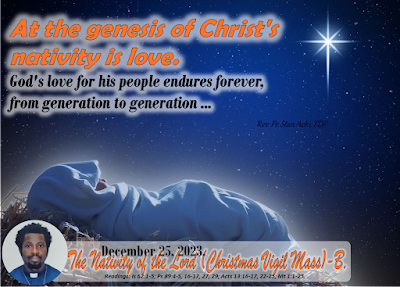THE GENEALOGY OF LOVE.
December 25, 2023.
The Nativity of the Lord (Christmas Vigil Mass) – B.
“The book of the genealogy of Jesus Christ, the son of
David, the son of Abraham.” (Mt 1:1)
A Serbian proverb says: “Your ancestor's glory should not
prevent you from winning your own.” A New Zealander proverb adds: “Walk in the
valley of your ancestors, learn of the history, and marvel at the beauty.”
At the genesis of Christ's nativity is love. God's love for
his people endures forever, from generation to generation. Our sinfulness and
weaknesses, as well as our wickedness, do not prevent him from loving us more
and more.
At Christmas, what we celebrate is the incarnation of love.
As Jesus said to Nicodemus: “For God so loved the world, that he gave his only
begotten Son, that whoever believeth in him should not perish, but have
everlasting life.” (John 3:16) And life everlasting is the fruit and the gift
of the everlasting love of God.
While we are celebrating tonight, the Nativity of the Son of
God in our humanity, the readings, particularly the Gospel, tell us how God
made use of human beings, sealed a covenant with them, and made them
cooperators of his mysterious love. We read the Gospel passage about the
Genealogy of Jesus which could be seen as the Genealogy of God's love. From
Abraham to Joseph, husband of Mary, God wrote the story of his love with
people, and it became the history of a people, Israel, the people of God.
St. Matthew's tracing of the lineage of Jesus raises many
theological questions and teaches us about how God works with human beings.
Matthew started from Abraham to Joseph and named each father in 41 generations,
all with their strength and weaknesses.
Abraham was not a saint or an immaculate man. Isaac, Jacob,
Judah, Boaz, David, Solomon, and even Joseph, each of them had his sin. They
had their weaknesses and human failures, but God made them his instruments.
We could make a list of the sins of Jesus' ancestors,
ascending and that will even lead us to Adam and Eve, the origin of human
weakness. In that sense, Abraham the old man had an affair with the maid of his
wife Sarah and later on, abandoned Hagar and her son Ismael. Jacob stole the
blessing that was intended for his brother Esau. And as a linear rule, sin continues.
So, in Jesus' family line is Raab, a prostitute from Jericho, or Ruth, a pagan
woman... Among the men, there is King David, the murderer of Uriah, with whose
wife he has committed adultery; and King Solomon, not only was womanizer but
also an idolater. Some others like
Rehoboam, and Abijah, sinned out of idolatry. And so, in this genealogical
sinfulness, Mary alone stands as Immaculate. So, Jesus was not born of holy and
blameless ancestors. His coming, however, will change the history of repeated
sins and redeem them all.
Meditating on these facts, we can look at our families and
hope that change is also possible. Every human family is called to achieve
sanctification. We must not give up in the face of the dramas that affect our
homes and relatives: abortions, divorces, betrayals, disloyalty, fraud, and so
many other villains... all these happen. But we should never give up because we
are sinners. God knows our sins, and he comes to share our lives and make it
part of the genealogy of his love.
God's love changes human nature and human story as well. St.
Paul, the main actor of our second reading, stands as an example. He was the
enemy of Christ and his persecutor. But after being transformed by God's
merciful love, Paul witnesses everywhere about Jesus as the Son of David, the
Savior of Israel. No one could silence him or keep quiet his faith. In today’s
extract from the Acts of Apostles, we hear him testifying of Jesus in the
Synagogue of Antioch in Pisidia. He goes through the history of Israel, passing
through David and he ends with John the Baptist. All these are to conclude that
Jesus is the Messiah, the Savior whom Israel expects.
“Today in the city of David a savior has been born for you who is Christ and Lord.” Said the Angels to the shepherds. Let’s all get out of our fears and bring the joy of Christmas to everyone we encounter. He is born to make of you and me his messengers, people who have a great concern for the neighbor and all those in need. Christmas is a call to get out. We are urged to be part and cooperators of God’s genealogical love. This Christmas, may we challenge ourselves to keep Christ and to give Christ. Our world lives a Christmas which little by little is no longer centered on Jesus but on commercial and social celebration. May we, instead, seize the opportunity to put Christ in the center of our Christmas. That will start through the love and service of our brothers and sisters in difficult and sorrowful situations.





Comments
Post a Comment